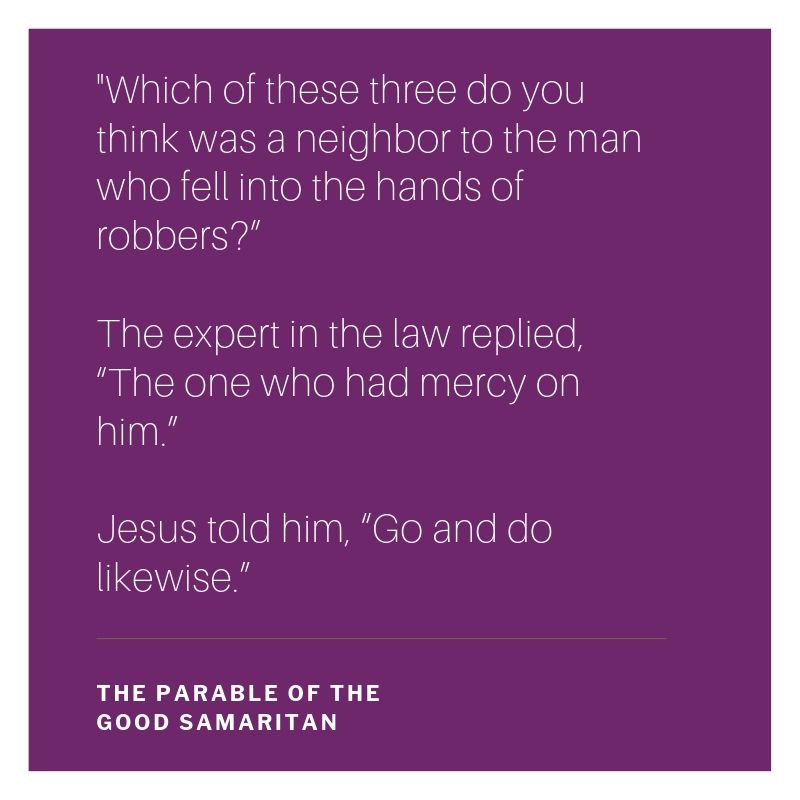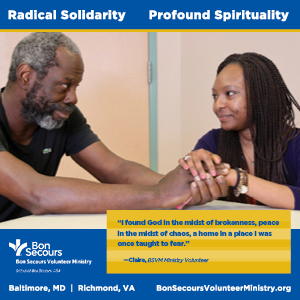Luke 10: 25-37
On one occasion an expert in the law stood up to test Jesus. “Teacher,” he asked, “what must I do to inherit eternal life?”
“What is written in the Law?” he replied. “How do you read it?”
He answered, “‘Love the Lord your God with all your heart and with all your soul and with all your strength and with all your mind’; and, ‘Love your neighbor as yourself.’”
“You have answered correctly,” Jesus replied. “Do this and you will live.”
But he wanted to justify himself, so he asked Jesus, “And who is my neighbor?”
In reply Jesus said: “A man was going down from Jerusalem to Jericho, when he was attacked by robbers. They stripped him of his clothes, beat him and went away, leaving him half dead. A priest happened to be going down the same road, and when he saw the man, he passed by on the other side. So too, a Levite, when he came to the place and saw him, passed by on the other side. But a Samaritan, as he traveled, came where the man was; and when he saw him, he took pity on him. He went to him and bandaged his wounds, pouring on oil and wine. Then he put the man on his own donkey, brought him to an inn and took care of him. The next day he took out two denarii and gave them to the innkeeper. ‘Look after him,’ he said, ‘and when I return, I will reimburse you for any extra expense you may have.
“Which of these three do you think was a neighbor to the man who fell into the hands of robbers?”
The expert in the law replied, “The one who had mercy on him.”
Jesus told him, “Go and do likewise.”
The Good Samaritan is a story we all probably know well. In the Gospel of Luke, Jesus uses this story to teach us that it is our duty to look after the welfare of all those we encounter, regardless of social status, ethnicity, or religion. We are called to care for the stranger. This is a message that we understand and strive to live out daily. But isn’t it interesting that this man, an expert in religious law, even asks Jesus this seemingly obvious question – “Who is my neighbor?”
Our faith, and our community living experiences in particular, train us to look beyond borders and see all people as our neighbors. We understand that our well-being is hinged on their well-being. “Who is my neighbor” is probably not a question we often ask ourselves because we have learned to think globally. However, lately I’ve noticed that I really can relate to the man who asks Jesus this question. I know the correct answer to the question, but I don’t actually know who my neighbors are.
A few weeks ago I was having a discussion about life in Washington, D.C. Around here, most conversations between new acquaintances start out with the question “Where are you from?” After chatting about growing up in the midwest, I repeated a statement that I had heard many times before – “No one is really from D.C.” Many of the young adults working for non-profits or politicians on Capitol Hill are new to the city, and only stick around for a few years. Now that I’ve lived here for more than six years, I often feel like a veteran.
A couple days later I found myself walking through my own neighborhood, trailing a few strides behind an elderly man that I didn’t recognize. The man warmly greeted by name the five or six people who walked past him during that two block stretch. Clearly, he was not new in town. More likely, he was right at home and it was me who was the stranger.
The earlier conversation popped back into my head, and I was immediately ashamed of my statement “no one is from D.C.” I live amongst people who have called this place their home for their entire lives – far longer than my six years here. How did I not notice this before? Whenever I was asked about my neighborhood, I would talk about the socioeconomic status of the people I lived near. I would say that the majority of my neighbors seem to be working class African Americans, living right around the poverty line. I would give this generic answer, unable to articulate any personal stories, because I knew none to share.
This experience made me aware that the community I had created for myself was limited and restricted. I had constructed a false reality – one that was comprised of people just like me. It’s not that I had been a bad neighbor – I was considerate, I listened to music at a reasonable volume, I didn’t litter, I smiled when I passed people on the street, but I hadn’t entered into the lives of the people living right next to me. I didn’t know who my neighbors are, and therefore I didn’t know how I could best serve them. Like the priest and the Levite, I was walking past people every day without really seeing them.
What was I doing to cause this disconnection? Well, I partly blame my iPhone. Since I don’t have a car, I get everywhere I need to go either by walking or taking public transportation. Normally, this would be an opportunity to build community, but I was choosing to use that time to catch up on my favorite radio programs, listen to Pandora, and make phone calls to friends and family. I rarely left home without my earbuds in, and as a result, I walked in a bubble of disconnection. There was no way I could build real relationships while isolating myself in that way.
I’m challenged by Jesus’ teachings about the Good Samaritan. He asks us to be a people who not only know the right answers, but live them out as well. We are called to be people who see those who are suffering as their neighbors, and have the courage to cross the street to help them. If I seek to serve my neighbors, I first need to learn to see them. From now on I’m going to put away my iPhone, walk a little slower, and hopefully this will be the first step in becoming a more loving neighbor to those who live right next door.
Questions for further reflection:
- What prevents you from being more connected to your neighbors?
- How does the parable of the Good Samaritan challenge you to be a loving presence to those who suffer?
This reflection originally appeared in the March 2013 issue of Staying Connected.



 Thousands of faith-based service opportunities can be at your fingertips with the RESPONSE. Download the latest edition today!
Thousands of faith-based service opportunities can be at your fingertips with the RESPONSE. Download the latest edition today!